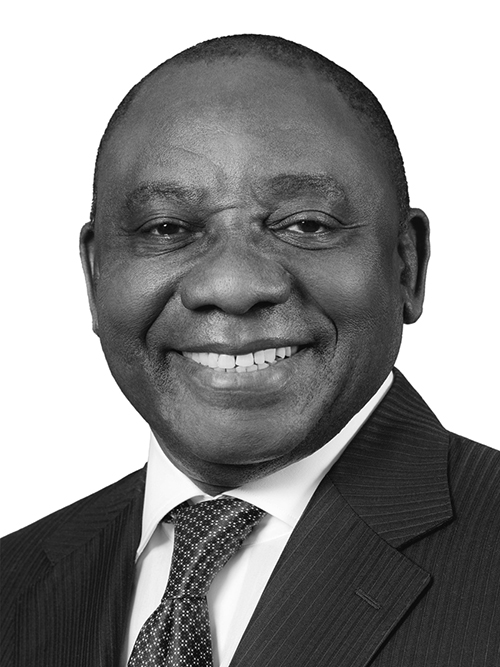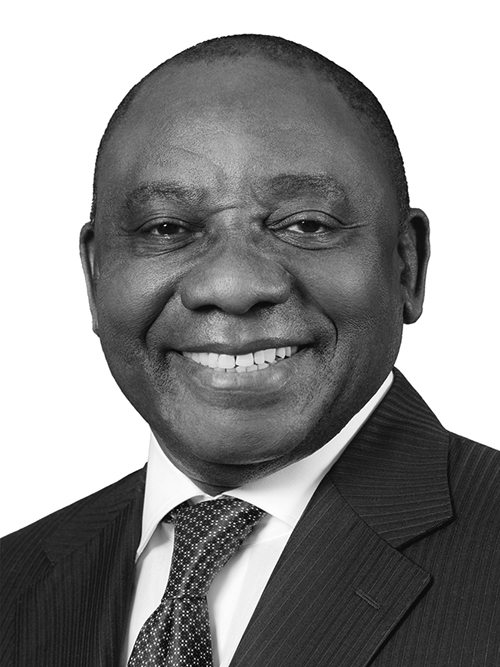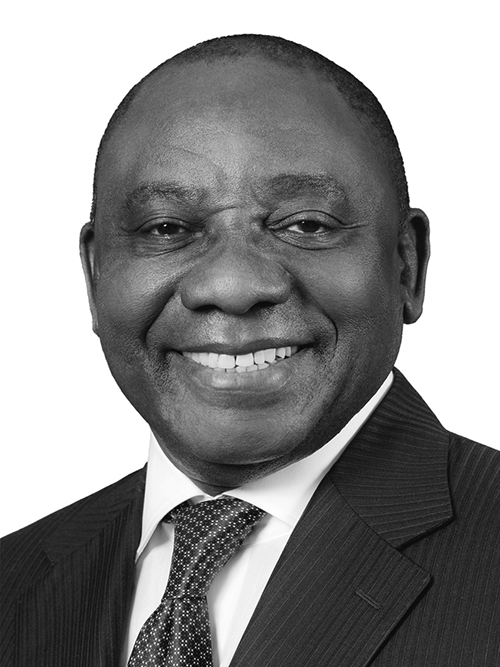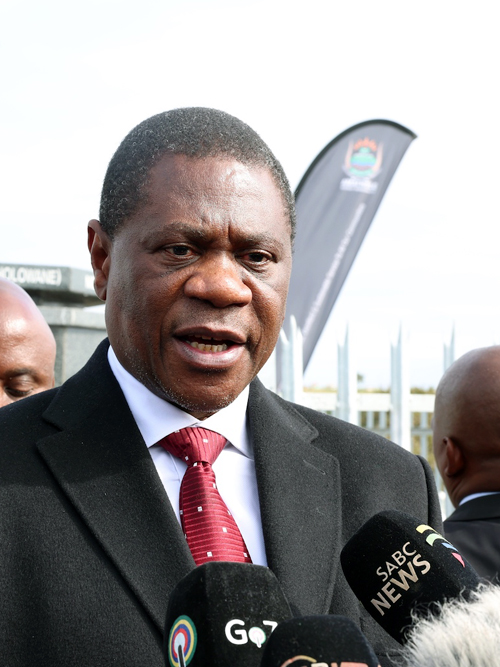Chairperson of the National House of Traditional and Khoi-San Leaders Kgosi T.M. Seatlholo;
Deputy Chairperson of the National House of Traditional and Khoi-San Leaders, Nkosi L. Mavuso;
Your Majesties and Royal Highnesses;
Ministers, Deputy Ministers, Premiers, and MECs;
Khosi-San Leaders;
AmaKhosi and Izindlovukazi ezikhona;
Tshwane Acting Executive Mayor, Cllr E. Modise;
Members of Parliament present;
Khotsong, Molweni, Lotshani, Ndi Matsheloni, Sanibonani!!!
Your Majesties, Traditional and Khoisan Leaders,
As a child born of Africa, I know well the ways of our ancestors, where one is not supposed to stand while addressing Majesties but kneel in reverence and respect, honouring Amakhosi.
The truth is that a weight rests upon my shoulders, for you have granted me the grace to stand before your presence.
At the same time, I feel both honoured and privileged to engage in this important dialogue with Your Majesties, AmaKhosi aseNdlunkulu, , and the esteemed Leaders and Members of the National House of Traditional and Khoi-San Leaders.
This dialogue is essential in ensuring that the Government fortifies its partnership with the Institution of Traditional Leadership, which I consider to be a direct conduit between the government and the local communities, especially those living in rural and communal areas of our country.
This is because you, Your Majesties and Royal Highnesses, and entire the Institution of Traditional Leadership have, for the longest time, been the custodians of our traditional leadership structures, custodians of our culture and customs, than elected politicians who hold public office for a shorter period of time.
As President Ramaphosa once stated, “you owe your positions to your bloodline. You are representatives of your forebears and leaders of your people. History has assigned you your positions and responsibilities”.
It is for this reason that Government cannot make decisions that affect you and your people without your involvement.
As voices of your communities and guardians of tradition, we, as government, have to integrate you into the process of decision-making, ensuring your views are respected, especially in the areas of land, inadequate infrastructure, customary law, fight against poverty, and community development.
We are confident that your presence in today’s dialogue will further amplify the voices of traditional communities, and that together we can find solutions to the problems that our communities face.
That is why we have always engaged the Institution of Traditional Leadership on critical policy matters and legislative reforms. To this end, the Department of Cooperative Governance and Traditional Affairs (COGTA) will soon be engaging Traditional and Khoisan Leaders on the Traditional and Khoi-San Leadership Bill (TKLB) before it is approved by Cabinet for introduction to Parliament.
The TKLB is a critical piece of legislation. It seeks to formally recognize the Khoi and San communities and their leadership structures, while also addressing the deficiencies of the Traditional Leadership and Governance Framework Act, No. 41 of 2003.
Once enacted, the Bill will provide a legal framework to recognize and regulate Traditional and Khoi-San leadership institutions, clearly outlining their roles, responsibilities, and engagement with government. This demonstrates both our commitment and responsibility as government to promote inclusive governance.
Our Government acknowledges that Traditional and Khoisan Leaders, have needs that require attention to effectively serve communities. The Inter-Ministerial Task Team (IMTT) on Traditional Leadership was established to address precisely the issues you have raised.
In 2022, President Ramaphosa established the Inter-Ministerial Task Team with the explicit intention of demonstrating our steadfast support for the work of Traditional and Khoisan Leaders in their communities. He insisted that the government must engage in frequent and close communication with you, the Traditional and Khoisan Leaders.
The IMTT's objective is to resolve obstacles that impede progress on issues raised by Traditional and Khoisan Leaders and to consolidate existing efforts. Our work as IMTT is structured into five workstreams to facilitate greater coordination and alignment.
Today, you will receive a comprehensive report regarding the advancements and obstacles encountered in each of these five workstreams, which are overseen by Ministers.
Without getting into detail, let me mention some of the work that has been achieved towards resolving concerns that Traditional Leaders have raised. This includes advancing land ownership, tenure rights and fast-tracking socio-economic development of rural communities.
On the issue of transferring ownership of communal land to Traditional Councils, we need to have sufficient consultation with the NHTKL and other stakeholders to discuss the mechanisms through which communal land can be transferred in line with Section 25 (6) of the Constitution.
To date, the Department of Cooperative Governance and Traditional Affairs has completed a desktop analysis and mapping of all Departmental Land, Trust Land, and other land in the former TBVC and self-governing Territories. The Department will conduct a thorough land audit to determine its ownership in this regard.
The Communal Property Associations Act has been amended, and the Trust Bill is in progress, but it still does not address conflicts between Traditional Councils, Trusts, and Communal Property Associations. The Department therefore plans to audit CPAs within Traditional Authorities' jurisdiction by 2026 and develop a dispute and mediation mechanism programme.
On the issue of remuneration, allowances and benefits of Traditional and Khoi-San Leaders, the Independent Remuneration Commission met with Traditional Leadership to table the report on their findings. The Commission has since drafted proposals on the salaries, allowances, benefits and tools of trade of Traditional and Khoi-San Leaders.
It is important that the Government provide Traditional and Khoi-San Leaders with "tools of trade" to support their roles in governance and community leadership.
We know that the National House of Traditional and Khoi-San has requested that they be provided a Chamber in Parliament to conduct their business. In this regard, the Minister of Public Works and Infrastructure is engaging the Speaker of the National Assembly to explore the possibility of this happening.
Bo Ndabezitha!
Another major issue that is of concern is the killing of Traditional and Khoi-San Leaders. In this regard, the Provincial Task Teams were established to work on this aspect. The South African Police Service and the Department of Traditional Affairs are exploring alternative options in terms of the protection of Traditional and Khoi-san Leaders.
In this regard, the SAPS is implementing the Traditional Policing Concept in four provinces, namely Limpopo, KZN, Eastern Cape, and Mpumalanga. The SAPS also provides services on wheels through the use of mobile client service centres to reach out to rural communities that are far from police stations.
As we work towards addressing your needs, I urge you, AmaKhosi, to never forget your mandate as leaders in our communities. Your commitment to promoting national unity, peace, stability, and community cohesion must be unwavering.
In addition, you must build, protect, and promote community culture and customs.
As the backbone of our communities, Traditional and Khoisan Leaders play an important role in establishing a capable and developing state. Your knowledge, expertise, and deep relationships with the communities make you invaluable collaborators in furthering our country's development objectives.
Your direction and leadership are critical to ensuring that government policies and programmes are effectively implemented and reach those who require them the most.
We also want the traditional leaders to participate in integrated planning, programme delivery and service delivery initiatives meant to benefit traditional communities. Across all spheres of government, we must promote collaborative partnerships between Government and Traditional Leaders.
Furthermore, Traditional Leaders play an important role in addressing societal issues in our communities. Your influence and authority can help address issues such as sexual offences, Gender-Based Violence, substance abuse, and crime in our communities.
As we commemorate Women's Month and remember those who fought tirelessly against pass laws, we must also stand as Traditional and Khoi-san Leaders against current challenges, including abuse of women and children.
We must never tolerate anyone using the name of culture as a justification for mistreating women. To eliminate negative elements of traditional culture and promote gender equality in our communities, we must all support positive features of traditional culture.
We must all work together to continue fostering the growth of a prosperous and united society that is democratic, free from sexism and discrimination on the basis of gender or race.
AmaKhosi, we are all aware of the high unemployment rate in our nation, which has a direct impact on our local communities. We will look to you contribute to the solution by recognising the skills gaps in your communities and supporting training initiatives that will give community members the know-how for available employment and entrepreneurial opportunities.
We think you can attract investment by promoting a stable and conducive environment for businesses to operate, leveraging your influence and understanding of local areas.
As we engage in dialogue today, let us reaffirm our commitment to working together towards a prosperous and inclusive future for all South Africans.
We must be active participants in our efforts to strengthen the social compact and collaborative efforts between the Government, civil society, and Inter-Faith formations to combat poverty, inequality, unemployment, social ills, the killing of Traditional Leaders, and underdevelopment, among other issues.
Our Government has the utmost confidence in your ability to guide our nation in the correct direction, and we are eager to work with you to address the time-sensitive issues that are currently plaguing our society.
Regarding your concerns, we understand that not all of the issues you have raised have been resolved. The most critical aspect is to reach a consensus with you regarding critical priorities that must be resolved in the immediate term, while simultaneously focusing on other, more complex issues that require long-term resolution.
Your Majesties, Traditional and Khoisan Leaders
We are gathered here on the eve of the convening of the first National Convention scheduled for 15 - 17 August 2025. This Convention serves as a precursor to the inaugural National Dialogue, planned for June 2026.
This historic gathering brings together representatives of all sectors of the South African society including government, political parties, civil society, traditional leaders, youth, religious groups, business, labour, academia, and government to reflect on the state of the nation and begin reimagining the future of our democracy.
The National Convention serves as the launchpad for an inclusive and people-led dialogue process aimed at carving a shared vision for the country. It is expected to come up with a clear roadmap to facilitate participation and ensure that citizens have the opportunity to contribute meaningfully to the Dialogue process.
As government, we encourage active participation of the Institution of Traditional Leadership in both the coming National Convention and the National Dialogue. We want our Traditional and Khoisan Leaders to be part of the new social compact that will drive progress towards Vision 2030 and lay the foundation for South Africa's next National Development Plan.
Your participation will be important for ensuring that the dialogue is inclusive and representative and produces a plan that reflects the interests and aspirations of all South Africans, including those in areas that you govern.
As we engage in dialogue today, let us leverage the power of our collaboration to address challenges, acknowledge successes, and create a brighter future for the generations ahead.
I thank you.











